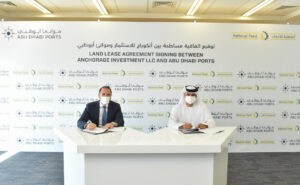French transport refrigeration rental company aims for UAE market-share
DUBAI, UAE, 7 March 2022: French transport refrigeration rental company, Petit Forestier, announced its intention of garnering market share in the UAE’s food cold chain sector.
Speaking to Climate Control Middle East, Petit Forestier, which also manufactures its refrigerated boxes, pointed out that its entire fleet of vehicles is ATP-certified, which enhances food safety, and ensures a low carbon footprint and cost-savings for the customer. ATP stands for “Accord Transport Perissable” (Agreement on the International Carriage of Perishable Foodstuffs and on the Special Equipment to be Used for such Carriage). It comes under the purview of the Transport Division of the United Nations Economic Commission for Europe (UNECE).

Stanislas Przyklang du Chassin
Stanislas Przyklang du Chassin, its Managing Director for UAE operations, highlighted that the company is the first to supply ATP-certified boxes in the UAE. “We are trying to push everybody and explain to everybody that it is really important for food safety that we install these here,” he said. “These boxes are between 900 kilograms and one ton lighter than locally available boxes.
Imagine how green they are. Lighter means they consume less petrol – the fuel consumption is 20-30% less than locally available boxes – which means lower CO2 emissions. So, we are working on the cold safety and the green side of the vehicle.”
Przyklang du Chassin admitted that ATP-certified boxes are 25-30% more expensive that locally available boxes. However, when all aspects are considered, they would guarantee greater cost savings for clients. “Yes, the cost of purchasing is higher, but at the end, the vehicle is one ton lighter, which means we can save 20-30% on fuel costs,” he said. “We have customers who are doing one petrol tank per day, which means they get their money back in one year. Also, a lighter vehicle means you don’t have to replace your brakes that often, which will mean a reduced cost of maintenance.”

Dimitri Doinet
Petit Forestier, which has factories in France and Poland, manufactures 7,000 insulated boxes a year. It said it is the only rental company that has an innovation department, working every day to find solutions related to green transportation and food safety. Dimitri Doinet, its Sales Director, said innovation is a key strength of the company.
Pointing to the vehicles, he highlighted the use of fewer metallic parts in the chassis, which make them lighter and, hence, more fuel efficient. He also highlighted that the insulation of the boxes is six centimetres in thickness, as compared to 10 centimetres in boxes available in the country. This, he said, allows for carrying more foodstuffs per load. He further highlighted the use of door sensors, which cut off the cold units on opening the doors of the truck, thus preventing exposure to hot ambient conditions.
From a food safety perspective, Doinet pointed to the use of unique antimicrobial air strips for preventing the ingress of hot ambient air to the vehicle. This, he said, was only the beginning, though. Adding to this, Przyklang du Chassin said the company offers vehicles fitted with mechanical air curtains, They are currently available only in Europe, though. He said customers are happy with the innovation, for they do not have an obstruction while entering the vehicle.
Przyklang du Chassin said the company would eventually offer air curtains in vehicles in the UAE. “This is something we have to test,” he said. “We have plans of bringing them here in the next five years.”
Speaking on the rental model of the business, Przyklang du Chassin said the company was proposing renting its vehicles for 5-6 years, during which it would offer commitment to the customer to manage every aspect of the assets. That way, he said, the customer would know that cold safety is respected. Petit Forestier, he said, offers a full complement of aftermarket services, including maintenance, repair and replacement.
Speaking on the speed of service and reaction time, Przyklang du Chassin said the company has the ability to give a replacement vehicle within a short duration. “If the client has any issue on the road, we can give a replacement vehicle in 20-30 minutes, so as to be able to continue delivering perishable foodstuffs,” he said. “With refrigerated vehicles, if you have a breakdown, you can lose everything, especially here. So, we have developed a full service to replace vehicles very quickly.”
Khalifa Port strengthens UAE food security with new facility

During the signing ceremony
ABU DHABI, UAE, 25 January 2021: Abu Dhabi Ports said it has inked a 50-year land lease agreement with Anchorage Investment, for the development of grain storage and processing plants at Khalifa Port, to be managed by National Feed, one of the largest Agro commodity processors in Abu Dhabi.
Making the announcement through a Press release, it said the new facility is set to be developed on a 100,000-square-metre plot. With an initial design capacity of 300,000 metric tons, the facility will introduce grain storage and processing capabilities to the multi-purpose port for the production of key food and animal feed ingredients, it added.
Providing Abu Dhabi Ports’ customers with direct access to competitive food ingredients, the facility will utilise grain resources to convert wheat into flour for baked goods, corn into starch, and glucose, barley, corn, and wheat by-products into animal feed, it said.
Saif Al Mazrouei, Head of Ports Cluster, Abu Dhabi Ports, said: “It is a great honour and privilege that Khalifa Port has been selected to serve as the future home for National Feed’s grain storage and processing facilities. Furthering the capabilities of our multi-purpose port and bolstering our ongoing activities within the region’s food supply chain, the operation will introduce several key advantages for the benefit of new and existing manufacturing customers. Our clients will be able to source ready-made, competitive products quickly.”
Following the official handover of the plot of land in the first quarter of 2021, the new project will house several grain silos capable of storing grain for an extended period, providing Abu Dhabi and the wider UAE with a long-term storage solution contributing to national food security, it said in the release.
Abu Dhabi Ports, part of ADQ, one of the region’s largest holding companies, has witnessed a tremendous increase in demand for food storage solutions across its ports and industrial zones, and has been quick to respond to demand, it said.
As such, it said, it has also developed ultra-modern cold and dry storage installations that provide importers and companies involved in food distribution with robust, efficient and sustainable services, along with local and regional distribution centres for handling food and medical supplies.
Edward Hamod, General Manager, National Feed, said: “We are extremely proud to be part of one of the most important ports in the region and the world. Having direct access to superior logistical capabilities not only enhances our service delivery but also allows us to expand our contribution to the national food security ecosystem.
“A robust logistical offering can play a fundamental role in the accessibility and cost structure of food commodity supply chains. With its deep-water capabilities, a strategic geographical location, and access to an extensive road and future rail network, Khalifa Port will unlock new opportunities for National Feed.” Hamod added that the port will not only increase National Feed’s grain storage and industrial capacities but also enhance the movement of products, which will be instrumental to “the abundance and competitiveness of food and feed strategic commodities in the UAE”.
Following the completion of the new facility, Abu Dhabi Ports said, it will leverage the capabilities of the new food storage and processing plant to extend its food supply chain activities within the region. In addition to expanding Khalifa Port’s role beyond handling food containers and livestock, the new facility, it said, will support the operations of world-leading food production brands that have established themselves in Khalifa Industrial Zone Abu Dhabi (KIZAD).
UAE Ministry of Climate Change and Environment underscores commitment to food safety
DUBAI, UAE, 6 January 2021: The UAE Ministry of Climate Change and Environment (MOCCAE) has stressed that the safety of foodstuffs, whether produced locally or imported, is among its highest priorities. In this context, the Ministry has implemented an integrated approach to enhancing food safety and security in the UAE, it announced through a Press release.
His Excellency Dr Abdullah Belhaif Al Nuaimi, Minister of Climate Change and Environment, said: “We aim to boost the UAE’s position as a regional and global trade hub for food products through applying the highest standards of food safety to locally produced and imported foods. In addition to keeping food-borne diseases at bay, our food safety controls and measures boost the competitiveness of food products exported and re-exported by the UAE.”
His Excellency Eng Saif Al Shara, Assistant Undersecretary for the Sustainable Communities Sector and Acting Assistant Undersecretary for the Food Diversity Sector, noted that a key pillar of food safety is the accreditation of slaughterhouses exporting meat and meat products to the UAE. He said: “MOCCAE, in collaboration with its stakeholders, works relentlessly to boost the safety of imported foods, and safeguard consumers from harmful and adulterated foods through a host of regulations and processes covering all stages of the supply chain. These include implementing world-class food safety standards, issuing relevant laws, establishing intel exchange mechanisms with the concerned local and international entities, upgrading food safety control procedures, and raising public awareness about sound food-related practices.”
His Excellency Eng Al Shara explained the accreditation process applicable to slaughterhouses that export meat and meat products to the UAE, aimed at ensuring they uphold the halal criteria for animal slaughter. MOCCAE, he said, has contracted trusted organisations overseas to inspect the meat production process at the facilities and submit technical reports to the National Food Safety Committee, comprising experts from the Ministry and local food control authorities from all emirates. After reviewing the reports, the Committee makes recommendations to MOCCAE regarding the accreditation of each slaughterhouse.
According to the Press release, in case the reports issued by the overseas entities or by the border inspection team testify to the slaughterhouse’s failure to adhere to the health or halal requirements, the Ministry immediately revokes its accreditation.
His Excellency Eng Al Shara emphasised that given the high demand for meat and meat products in the UAE, their safety for consumption is a priority for MOCCAE. In this context, the Ministry verifies the documents accompanying inbound consignments shipped by accredited slaughterhouses, such as halal certificates, certificates of origin, and health certificates. It also conducts physical and laboratory tests on samples from shipments, and takes action against those who trade in food products that are non-compliant with food safety regulations or shariah rules.
Islington and Clapham
As we bid goodbye to 2020 and gingerly step into 2021, the feeling is not of relief, because the virus is still on the prowl. It must be added, though, that we have reached an inflexion point with the early promise being shown by some of the vaccines that have been deployed.
Now, amidst the carnage of 2020, we have been witness to heartwarming instances of human endeavour – of the medical fraternity putting their lives at risk to save others, of boffins hard at work harnessing the power of science and engineering to provide relief to not only healthcare workers but also numerous other sectors.
Away from the COVID scene, there are other instances that have stood out. Like the Bunhill Heat and Power Network project, in central London, which uses waste heat from the London Underground network to supply heat and hot water to nearly 1,500 homes and other facilities in the Borough of Islington, in a bid to lower indirect carbon emissions and to achieve carbon neutrality by 2030. Human ingenuity repurposed the former City Road London Underground station into an underground air extraction system. It draws warm air from the tunnels, still in use by the London Underground’s Northern Line.
Not only will the project reportedly lower indirect emissions but also cut heating costs by 10%, benefitting the residents connected to the network – a case of district energy providing succour to tenants by passing on the savings.
What is even more heartwarming, according to the company that supplied the technology to the project (see story on page XX) is that it can be replicated in underground networks the world over.
As if by coincidence, the subterranean labyrinthine depths of London constitute the theatre for yet another instance of human ingenuity and resourcefulness. Growing Underground is a farming enterprise that is using long-forgotten World War 2 tunnels used as shelter during air raids conducted by the Luftwaffe. About 100 feet beneath London’s Clapham, growers working for the enterprise are busy harvesting micro-greens using hydroponic technology, which uses 70% less water, when compared to traditional farming practices. The produce is pesticide-free and provides an opportunity to Londoners to eat fresh and without the guilt from knowledge that the greens on their plate are the result of burning copious volumes of climate-threatening fossil fuels in transporting them to their doorstep. The project is redefining food supply chains for the better and lowering food wastage by increasing shelf life.
Such examples as the Islington district energy scheme and Growing Underground serve as inspiration for us to consider abandoning some of the hackneyed approaches that are not taking us far in our quest for a better planet. They are about courage and speak of a certain frontier spirit that we ought to consider embracing.
Italy pavilion for EXPO 2020 aims to tackle global sustainability challenges, says ambassador
Dubai, UAE, 20 March 2019: The Italian tradition is a mix between beauty and function, said His Excellency Liborio Stellino, Ambassador of Italy to the UAE, following a special preview of the Italian Pavilion for EXPO 2020, presented by Carlo Ratti, Professor, Massachusetts Institute of Technology; Founding Partner, Carlo Ratti Associati, and one of the architects that designed the Pavilion during Italian Design Day on March 19, at the American University in Dubai. Stellino stressed that legacy is an important element driving Italy’s participation in EXPO 2020 and that the Pavilion aims to showcase key learnings related to food safety and security and future energy gained from previous Expos in a bid to address the global challenge facing sustainability in a more holistic manner.
Providing a brief history on the country’s long-standing commitment towards sustainable practices, Stellino said: “The importance of energy started in 1973, when we had the first oil crisis. From the time, we tackled problems of energy efficiency, we developed a lot of techniques, technologies and expertise. Today, in Italy, despite the lack of oil and natural resources, we save 20% [of electricity], thanks to better efficiency of buildings.”
Stellino said that despite being associated with classic and traditional buildings, Italy has made great strides in integration of technology for modern infrastructure, owing to the expertise of the engineering and architectural community, stressing that innovation is in their DNA. “The close link between entrepreneurship and art has oriented our design in a more functional way,” Stellino said. Ratti discussed the vital role sustainable cooling plays in modern infrastructure, adding that while the Italian pavilion will be generally cooled using air conditioning, there is a move to incorporate passive cooling design elements to make the most of the time of the year, when the UAE has cooler temperatures.


